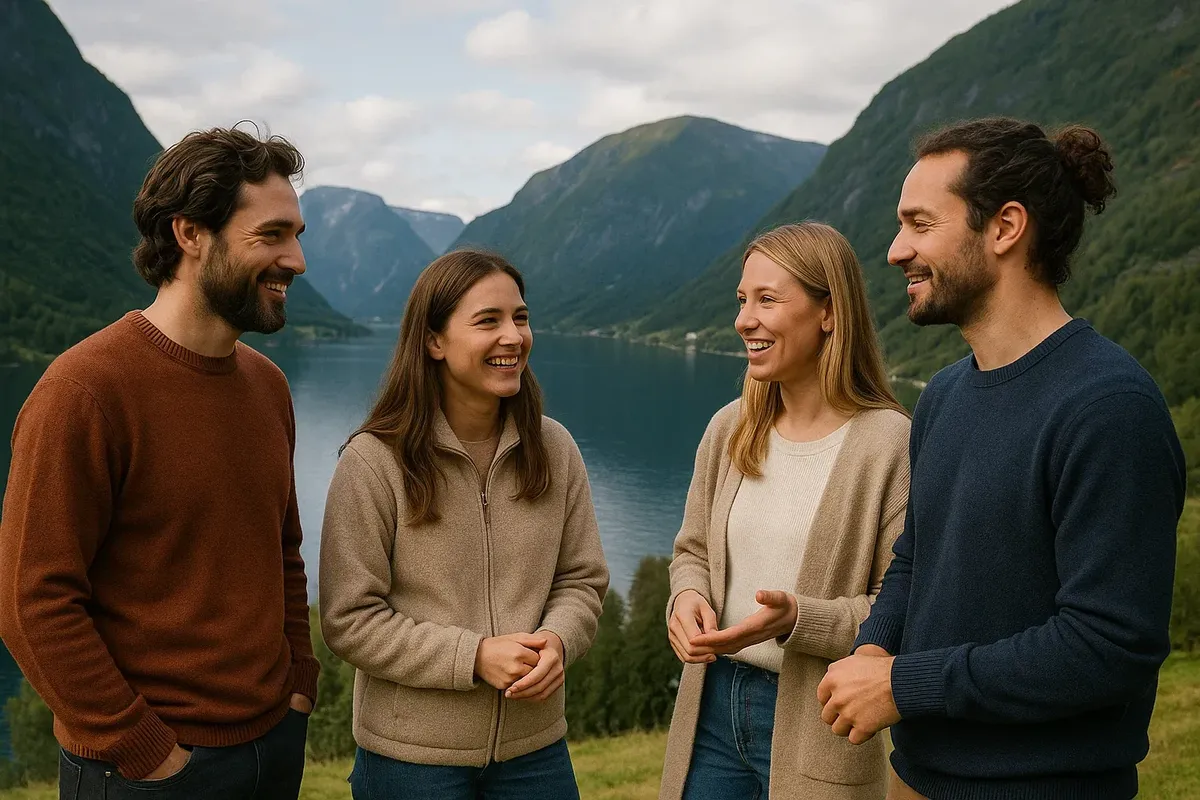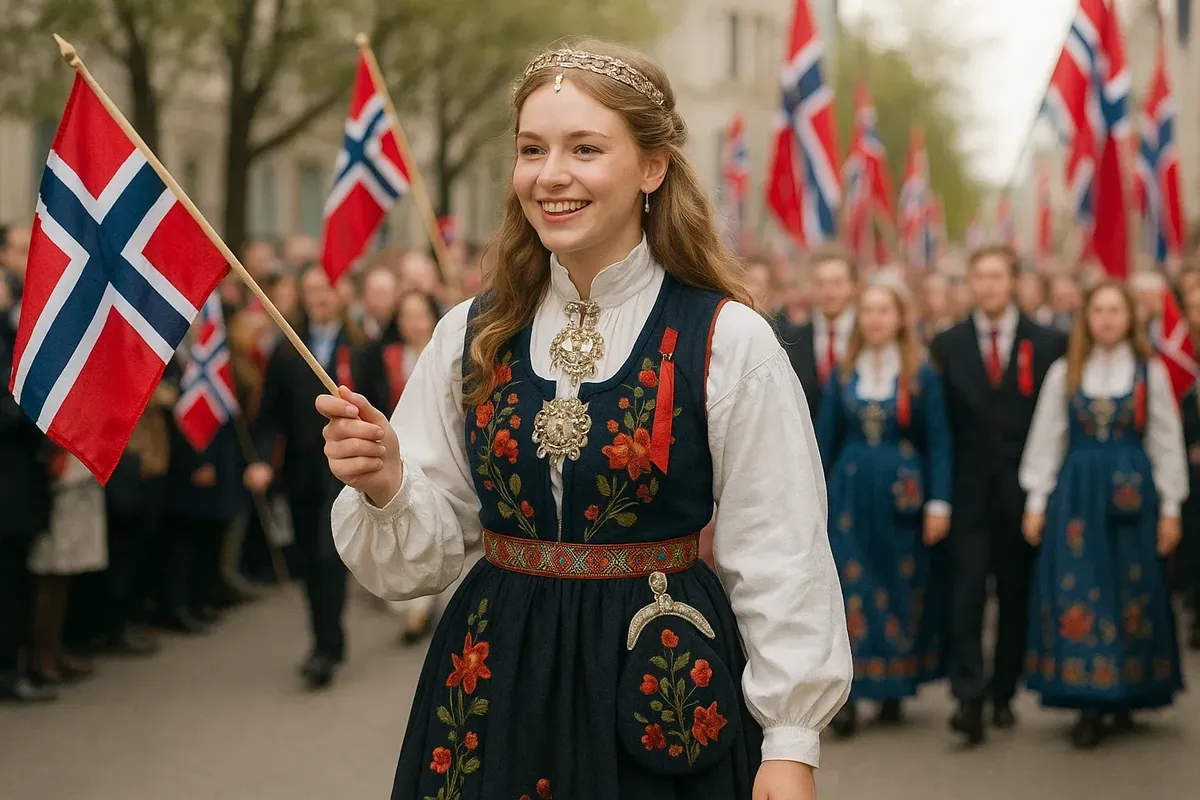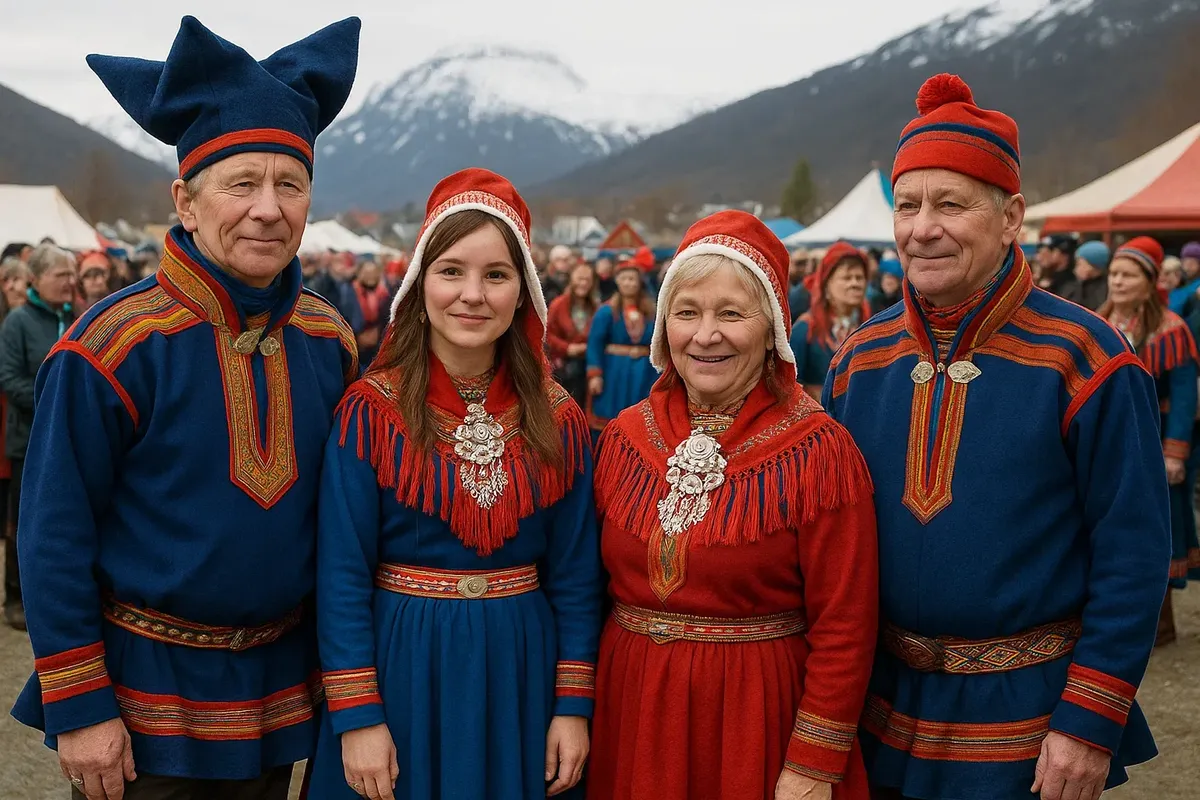🎭 Norwegian culture, etiquette and traditions: a guide for travellers and expats (updated 2026)
Norwegians can seem a bit reserved and even cold at first, but don't be fooled! At the end of the day, communication is all about respecting each other's personal space and modesty. The famous Janteloven ('Jante's Law') defines the Norwegian way of life, and knowledge of local traditions, holidays and rules will help you better understand Norwegian culture. To help you feel at home in Norway, we've put together a list of 10 important questions. Whether you're planning a short trip or settling down for the long term, these questions will help you feel comfortable and integrated into society.
📜 What is ‘Janteloven’ and why is it important?
Janteloven, or 'Jante's Law' as it's also known, is an unofficial social code that's really common in Scandinavia. It's all about treating everyone with kindness and humility, knowing that we're all in this together. No one should feel like they're better than anyone else, and it's important to remember to stay grounded and humble. If you're not from here, it's probably best to avoid showing off how rich you are or acting like you're better than others. Hey, why not give a little shout-out to the achievements of others and maybe share a little about yourself, but keep it real and humble! We all know that Norwegians are a modest and egalitarian people, so they tend to steer clear of things like open competition and ostentatious luxury. Here's a little life hack for you: be open when communicating, but don't go overboard with personal questions – everyone's got their own privacy boundaries, and it's important to respect those.

🚫 I'd love to know: what topics do you think are best avoided when communicating with Norwegians?
When Norwegians first meet you, they'll do their best to keep their personal lives to themselves. This means you won't hear about their income, their problems or their political views. It's also usually best not to bring up religion if you're not close enough to someone. You know, I've noticed that Norwegians rarely ask about marital status and children. We've got some great topics for you, like nature, travel, sports and culture. Here's a little trick I've learned: if you're ever not sure what to say, just ask about the weather! It's a topic that always comes up, and it's something we love to chat about here in Norway.
👋 How to greet and say goodbye to Norwegians?
The Norwegian way is all about making people feel welcome from the get-go. When Norwegians greet each other, they give you a warm handshake and look you in the eye, smiling gently. Kisses on the cheek or hugs are rare and only acceptable with close friends. When you're about to leave, it's a really nice idea to say a simple 'ha det' or 'vi sees' (see you later) to the people you're leaving behind. Hey, here's a little life hack for you: when you're meeting someone for the first time, try addressing them by their first name. It's a really nice way to make them feel close to you.
🏡 How to behave when visiting Norwegians?
If you're invited to someone's home, it's always a good idea to bring a little something. Flowers, chocolate or wine are all great options. We love it when you're on time, or even 5 minutes early, so we can get started right away. We would love you to take your shoes off when you come in, it's just a little thing we've asked you to do to make you feel more at home. When you're at the table, just wait for the general 'Vel bekomme!' (enjoy your meal) and don't start eating before the hosts. Here's a little life hack for you: after dinner, it's nice to send a short message of thanks ('Takk for sist' – thank you for the last meeting).
🎉 What do you need to know about national holidays and traditions?
The main holiday is 17 May (Grunnlovsdag), Constitution Day. On this day, children's parades are held throughout the country, people wear traditional costumes (bunad) and have festive breakfasts and lunches. Christmas (Jul) is a special time for us, when we get together with our loved ones for a delicious family dinner on the 24th of December. When Easter comes around, it's a really lovely tradition to head to the mountains and enjoy a cosy read – something we like to call a 'Easter crime story'. Hey, I just wanted to share a little secret with you: if you want to feel like one of the family during your holiday, make sure you visit the city parade on 17 May. The atmosphere is absolutely amazing, and everyone is so happy to welcome guests.

👕 Hey, I totally get it – how do you dress so you don't stand out in Norway?
Our lovely Norwegian friends tend to prefer practical and modest clothing, so you'll often see them wearing jeans, sweaters and T-shirts. It's not often you'll see bright colours or overly revealing clothing, even in summer. When it's cold outside, you'll want to make sure you're snug and cosy in thermal underwear, comfy shoes and a waterproof jacket. Casual smart is still a big thing in offices. Hey, I've got an awesome life hack for you! Why not treat yourself to a lovely wool sweater (lusekofte)? It's a super classic piece of Norwegian clothing that'll always come in handy, no matter what you're up to.
⏰ How do Norwegians feel about punctuality?
In Norway, being on time is really important, both in our personal lives and at work. If you're more than 5–10 minutes late, it's not cool. If you're going to be late, don't worry - just send a quick text to let everyone know. Here's a little life hack for you: if you can, try to arrive a little early and have a cup of coffee while you wait. I promise you, it'll be really appreciated!
🦌 What is important to know about Sami culture and etiquette?
The Sami people are the indigenous people of northern Norway. Their culture is lovingly protected by law. It's really important to be respectful, so please don't photograph the Sami people without asking first, and please don't touch their traditional clothing or accessories, okay? If you're lucky enough to visit a Sami village or event, please, please listen carefully to your guide and follow all the rules. Here's a little souvenir tip: when you're buying gifts to take home from your trip, make sure they're authentic (look for the 'Sámi Duodji' stamp). This way, you can be sure you're supporting the local economy and respecting the traditions of the people who live there.

☕ How to behave in a restaurant or café?
It's always a nice touch to leave a little extra in restaurants (around 5–10%), but it's totally up to you. And don't forget to thank the waiter – a warm 'takk!' will do the trick. When you visit a self-service café, such as Espresso House or Kaffebrenneriet, you can help yourself to your own dishes and tray. Here's a little life hack for you: ask for the daily special ('dagens rett') and you'll get great value for money and fresh, local produce every time.
🤝 How to maintain friendships with Norwegians and integrate into society?
Norwegians may be a bit on the shy side when it comes to making friends, but once they do, you can count on a friendship that's as strong as a rock and will last for years. Why not take the initiative and invite some people for coffee (kaffepause) or hiking? We would really encourage you to get involved in volunteer projects like FjordClean and local clubs (Idrettslag) as a really great way to get to know people and make friends.
Here's a little secret: learning a few friendly phrases in Norwegian will really warm the hearts of the locals. Norwegian culture might take some time to get used to, but you'll be met with endless friendliness, respect and a genuine feeling of belonging. If you follow a few simple rules of etiquette, show respect for local traditions and the Jante Law, you'll discover a Norway that is warm, welcoming and open to friendship.




2 comments
Log in to leave a comment
Er det noen kulturelle «feller» man bør unngå som turist i Norge? 😄